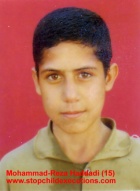As of April 6, 2008 Stop Child Executions Campaign has recorded 103 children facing executions worldwide: 96 in Iran, 3 in Saudi Arabia, 3 in Sudan and 1 in Yemen.
9 juveniles are reported to have been executed since January 1, 2007: 8 in Iran and 1 in Saudi Arabia.
Since January 1, 2007 , 5 minors have been saved from execution: 3 in Iran, 1 in Yemen and 1 in Saudi Arabia
List of minors on the execution row:
IRAN (96)
Girls (3):
- Delara Darabi, 17
- Nazbibi Ateshbejan, 16
- Soghra Najafpour, 13
Boys (93):
- Abbass Hosseini, 17
- Abdolkhaleq Rakhshani
- Ahmad, under 18
- Ahmad, 16
- Ahmad Jabari, 15
- Ahmad Mortazavian,15
- Ahmad Nourzahi, 12
- Akoo Hosseini
- Ali, 17
- Ali Alijan, 17
- Ali Amiri, 13
- Ali Mahin Torabi, 16
- Ali Norumohammadi, 16
- Ali Shabehzadeh, 17
- Alireza Movassili Roudi, 16
- Amir Amrollahi, 16
- Amir Calehchaleh, 17
- Asghar, 16
- Behador Khaleqi, 16
- Behnam Zare, 15
- Behnood, 17
- Behrouz Shojaee, 16
- Beniamin Rasouli, 17
- Ebrahim Mehrnahad, 16
- Farshad Sa’eedi, 17
- Farzad, 15
- Fazlorahman Jahraz, 16
- Feyz Mohammad, 16
- Feyzollah Soltani
- Gholam Nabi Barahouti, 16
- Habib Afsar, 15
- Hamed, 15
- Hamed Pour-Heydari, under 18
- Hamid, 17
- Hamid Reza, 14
- Hamzeh S., 17
- Hani Momeni Yasaqi
- Hasan Mozaffari
- Hedayat Niroumand, 14 or 15
- Hossein Haghi, 17
- Hossein Toranj, 17
- Iman Hashemi, 17
- Javid, 17
- KhodamoradMon Shahemzadeh, 17
- Khosrow, 16
- Mahmoud, 17
- Masoud, 17
- Masoud Kafshir, under 18
- Mehdi, 16
- Mehdi Azimi, under 18
- Mehyar Haghgoo, 17
- Mehyar Anvari, 17
- Milad Bakhtiari, 16
- Mohammad Ahmadi 16
- Mohammad Ghos, 17
- Mohammad Jahedi
- Mohammad Jamali Paghale, 15
- Mohammad Mavari, 16
- Mohammad Pezhman
- Mohammadreza Haddadi, 16
- Morteza Feizi, 16
- Mosleh Zamani 17
- Mostafa, 16
- Mostafa Sa’idi
- Mostafa Naghdi, under 18
- Nabavat Baba’I, 17
- Na’im Kolb’ali, 15
- Naser Qasemi, 15
- Ne’mat, 15
- Nosrat, 15
- Omarraddin Alkuzehi, 17
- Omid Sarani, 17
- Rahim Ahmadi, 16
- Rahman Shahidi
- Rasoul Eyvatvandi, 17
- Rasoul Mohammadi, 17
- Rasoul Nouriyani
- Rasoul Safari, 17
- Reza,16
- Reza Alinejad, 17
- Reza Padashi, 16
- Saber
- Sadegh Ahmadpour, 17
- Saeed Jazee, 17
- Safar Angooti, 17
- Sa’id Arab
- Sajjad, 17
- Salman Akbari, 17
- Seyed Reza Hejazi, 15
- Shahram Pourmansouri, 17
- Siyavash Shirnejad
- Vahid, 16
- Zolf’ali Hamzeh,
SAUDI ARABIA (3):
- Rizana Nafeek (female – 17)
- Sultan Bin Sulayman Bin Muslim al-Muwallad (15)
- Issa bin Muhammad ‘Umar Muhammad (13) Chadian national
SUDAN (3):
- Abdelrhman Zakaria Mohamed (male – 16)
- Ahmed Abdullah Suleiman (male – 16)
- Al-Tayeb Abdel Aziz (male – 16)
YEMEN (1):
- Hafez Ibrahim (male – 16)
Recorded Child Executions in 2007 and 2008:
IRAN (9)
- Makwan Moloudzadeh Male-17 (executed on December 5, 2007)
- Mohammad Mousavi, Male-16 (Mohammad is listed on SCE petition but he was executed on April 22, 2007)
- Saeed Kamberzai, Male-17 (executed on May 28, 2007)
- Babak Rahimi, Male-17 (executed on October 17, 2007)
- Hossein Gharabaghloo, Male-16 (executed on October 17, 2007)
- 2 Afghan Boys executed in Iran (reported by BBC and Afghanistan Independent human rights commission)
- Mohammad Reza Turk (executed on November 15, 2007)
- Javad Shojaee (executed on February 26, 2008)
SAUDI ARABIA (1)
- Dhahian Rakan al-Sibai’i Male-15 (executed on July 21, 2007)
Children saved from Execution since January 1, 2007:
IRAN (3)
- Nazanin Fatehi
- Sina Paymard
- Mohammad Latif
Yemen (1)
- Hafiz Ibrahim
Saudi Arabia (1)
- Sultan Kohail
 17 year old
17 year old 
 Mohammad Reza Haddadi, aged 18, is held in Adelabad prison in the city of Shiraz. He was sentenced to death in January 2004 by a court in Kazeroun for the murder of a man in 2003. He had confessed to the murder, but retracted the confession during his trial, saying he had claimed responsibility for the killing because his two co-defendants had offered his family money if he did so. Mohammad Reza Haddadi stated during the trial that he had not taken part in murder of a man who had offered him and the two others a lift in his car. The two others later supported Mohammad Reza Haddadi’s claims of innocence, and withdrew their testimony that implicated him in the murder. His co-defendants, both over 18 at the time of the crime, are said to have received lesser sentences. However, in July 2005, a branch of the Supreme Court upheld the death sentence against Mohammad Reza Haddadi. The case is awaiting final approval by Ayatollah Shahroudi, the Head of Iran’s Judiciary.
Mohammad Reza Haddadi, aged 18, is held in Adelabad prison in the city of Shiraz. He was sentenced to death in January 2004 by a court in Kazeroun for the murder of a man in 2003. He had confessed to the murder, but retracted the confession during his trial, saying he had claimed responsibility for the killing because his two co-defendants had offered his family money if he did so. Mohammad Reza Haddadi stated during the trial that he had not taken part in murder of a man who had offered him and the two others a lift in his car. The two others later supported Mohammad Reza Haddadi’s claims of innocence, and withdrew their testimony that implicated him in the murder. His co-defendants, both over 18 at the time of the crime, are said to have received lesser sentences. However, in July 2005, a branch of the Supreme Court upheld the death sentence against Mohammad Reza Haddadi. The case is awaiting final approval by Ayatollah Shahroudi, the Head of Iran’s Judiciary. Reza Hejazi – then aged 15 – was among a small group of people involved in a dispute with a man on 18 September 2004, which resulted in the man being fatally stabbed. Reza Hejazi was arrested and tried for murder, and on 14 November 2005 he was sentenced to Qesas (retribution) by Branch 106 of the Esfahan General Court. The sentence was approved by Branch 28 of the Supreme Court on 6 June 2006, although under Iranian law he should have been tried in a juvenile court. The case was referred for mediation between Reza Hejazi and the victim’s family, to try and arrange for the payment of diyeh, but no sum has yet been agreed. If no agreement is reached, Reza Hejazi will be executed.
Reza Hejazi – then aged 15 – was among a small group of people involved in a dispute with a man on 18 September 2004, which resulted in the man being fatally stabbed. Reza Hejazi was arrested and tried for murder, and on 14 November 2005 he was sentenced to Qesas (retribution) by Branch 106 of the Esfahan General Court. The sentence was approved by Branch 28 of the Supreme Court on 6 June 2006, although under Iranian law he should have been tried in a juvenile court. The case was referred for mediation between Reza Hejazi and the victim’s family, to try and arrange for the payment of diyeh, but no sum has yet been agreed. If no agreement is reached, Reza Hejazi will be executed.  Iman Hashemi was 17 in June 2007 when his brother Majid was arrested for fatal stabbing of a man in a fight. Following his brother’s arrest, Iman Hashemi was said to have presented himself to the investigating authorities and confessed to having murdered the man, though he later implied in court that he had been coerced into confessing. Despite his family’s insistence that he was innocent, a court in Esfahan sentenced him to Qesas for murder on 13 January 2007. On 26 May 2007, Branch 42 of the Supreme Court upheld the verdict. Distraught, on 29 September 2007 his brother Majid set himself on fire. Four months later he died of his injuries. The verdict has not been approved by the Head of the Judiciary.
Iman Hashemi was 17 in June 2007 when his brother Majid was arrested for fatal stabbing of a man in a fight. Following his brother’s arrest, Iman Hashemi was said to have presented himself to the investigating authorities and confessed to having murdered the man, though he later implied in court that he had been coerced into confessing. Despite his family’s insistence that he was innocent, a court in Esfahan sentenced him to Qesas for murder on 13 January 2007. On 26 May 2007, Branch 42 of the Supreme Court upheld the verdict. Distraught, on 29 September 2007 his brother Majid set himself on fire. Four months later he died of his injuries. The verdict has not been approved by the Head of the Judiciary. PUBLIC AI Index: MDE 13/009/2008 06 March 2008
PUBLIC AI Index: MDE 13/009/2008 06 March 2008